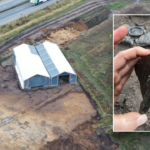Midlife is usually a bizarre time. Perhaps you’re grappling with new aches and pains or mind fog. Maybe you’re one of many 2.5 million sandwich era caregivers concurrently caring for kids and growing old dad and mom. Perhaps you’re having an identification disaster, perhaps not.
Center age lands someplace between 36 and 64, or perhaps 40 to 60, relying on whom you ask. It’s also an inflection level in relationships, consultants say, a time when many {couples} emerge from the every day grind of constructing careers and a household, and discover that they’re in a union they now not totally acknowledge. Charges of “grey divorce” amongst adults over 50 have doubled in america because the Nineteen Nineties.
“In case you have kids, your kids are usually launching,” stated Linda Hershman, the creator of “Grey Divorce” and a licensed marriage and household therapist primarily based in Pennsylvania. “{Couples} are out of the blue turning round and one another and considering: What is that this marriage about, and what’s this marriage going to be about?”
We requested Ms. Hershman and different relationship consultants to supply some big-picture questions that middle-aged {couples} can focus on — or can ask themselves — to assist them higher perceive their relationships, and what they need.
What’s our subsequent chapter?
Orna Guralnik, a Manhattan-based medical psychologist and psychoanalyst who stars within the Showtime documentary sequence “{Couples} Remedy,” encourages her shoppers to contemplate their plans for the third chapter of their relationships (when the wedding is neither contemporary and new, nor consumed by home calls for).
It’s a dialog she sees many {couples} having organically, notably these of their 50s and 60s whose kids have left dwelling. “The place are they going to show that spotlight?” she typically asks. “And the way is that going to inflect the couple?”
Galena Rhoades, a psychologist and analysis professor on the College of Denver, has suggested shoppers to ask each other: “What are our large hopes and goals?” Embracing the chance to fantasize might help domesticate a shared sense of optimism, she stated.
Does one in all you wish to transfer to a brand new metropolis or to journey extra? Throw your self into a brand new pastime or ability? Grow to be extra civically engaged?
“Not all of these issues will likely be doable to suit into the remainder of the construction of your life,” Dr. Rhoades stated. “However I feel there’s loads of worth in having that point collectively to attach — and in seeing the connection as a spot the place you possibly can dream large.”
What are we modeling for our youngsters?
Dr. Rhoades, who’s an creator on a forthcoming version of “Preventing For Your Marriage,” stated that her shoppers put actual thought and care into how they work together round their kids once they’re youthful.
“As soon as their children are adults, it’s like they type of neglect they’re nonetheless position fashions,” she added.
She has suggested that {couples} ask: What do we wish our youngsters to be taught from our relationship? How would possibly that form their very own relationships?
As an example, perhaps you wish to make it clear that relationships take work, Dr. Rhoades stated, so that you discuss to your kids about the way you deal with battle. Maybe it’s emphasizing the significance of date nights and prioritizing coupledom.
How do I contribute to our issues?
This sort of self-reflection is less complicated stated than carried out, admitted Adam R. Fisher, a psychologist and intercourse therapist primarily based in Salt Lake Metropolis. However by midlife, most of us have discovered one thing about ourselves and {our relationships}.
Dr. Fisher stated that taking time to mirror on the kind of associate they wish to be — no matter what their associate does or doesn’t do — in the end provides his shoppers a higher sense of company inside their relationships.
You would possibly say to your self: “Even when I’ve large complaints about my associate, I do know I don’t present up like an ideal angel — and I’m attempting to work on these issues,” Dr. Fisher stated.
Instead you would possibly ask your associate to share one or two methods by which you’re tough or make their lives more durable, he stated — although he shortly acknowledged that concept might not work for {couples} who’re struggling to speak or for whom that query would possibly really feel unsafe.
In the end, occupied with the kind of associate you wish to be is a means of balancing out the tendency many people need to blame our companions for our issues.
What expertise have we developed?
By the point {couples} attain center age, many have fallen into decades-long communication patterns, some higher than others, stated Jeffrey Chernin, a wedding and household therapist primarily based in Los Angeles and the creator of “Attaining Intimacy.”
So he typically encourages companions to consider the optimistic communication expertise they’ve developed. “You wish to fortify these,” he stated.
Perhaps you’re each good at listening with out interrupting, for instance. Perhaps you’re execs at apologizing. Merely acknowledging a few of these strengths is usually a helpful bonding train, Mr. Chernin stated.
“Let’s strengthen what’s going nicely,” he stated, “not simply handle what must be improved.
{Couples} who’ve been collectively for some time may additionally neglect why they like one another, in order that they want to have a look again, prompt Harriet Lerner, a psychologist primarily based in Kansas and creator of “The Dance of Anger.”
“When {couples} revisit the qualities that first drew them collectively, it shifts the emotional local weather of the dialog, enlivens the current second and serves as a robust reminder of the inspiration on which their relationship was constructed,” Dr. Lerner stated.
Is that this relationship price it?
With expertise, most individuals come to grasp that nobody will get every thing they need from one particular person, stated Terrence Actual, a household therapist and creator of “Us: Getting Previous You and Me to Construct a Extra Loving Relationship.” Which is why center age is usually a good time to have what he calls a “relational reckoning.”
“A relational reckoning is a query,” he defined, “and the query is: Am I getting sufficient on this relationship to make grieving what I don’t get OK with me?”
As an example, perhaps you and your associate don’t have one of the best intercourse life, however you may have an exquisite emotional connection and also you’ve constructed a cheerful household, he stated. If that trade-off is OK with you, you acknowledge that and grieve the lack of what you don’t have.
“Grieving and digesting the boundaries of each other’s human imperfections is a central a part of long-term intimacy,” Mr. Actual stated.
Ought to we get outdoors assist?
It is very important method the questions above with a way of curiosity and openness, stated Tiana Frazier, a licensed marriage and household therapist primarily based in Texas. Attempt to keep current and keep away from changing into defensive, she stated, and “if the dialog turns into overwhelming, it’s OK to take a break.”
{Couples} who’re considering whether or not they wish to keep collectively — or maybe to transform the construction of their relationship — might wish to have interaction skilled assist. Discernment counseling is an possibility for {couples} who’re pondering large adjustments, Ms. Hershman stated.
Relying in your circumstances, you would possibly contemplate a particular type of counseling, like intercourse remedy, or particular person remedy in case your associate is reluctant to affix you.
No matter you do, don’t wait till issues explode, Mr. Actual stated. “The stuff you’re not getting construct up resentment,” he added, and by the point many {couples} discover their technique to a therapist “their resentment is leaking out everywhere.”






